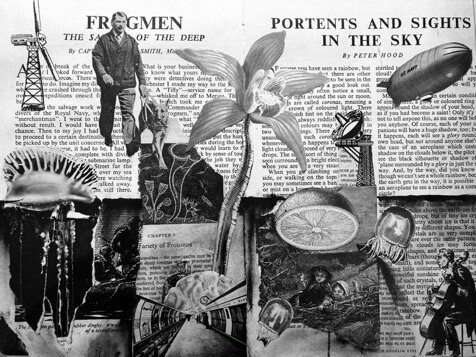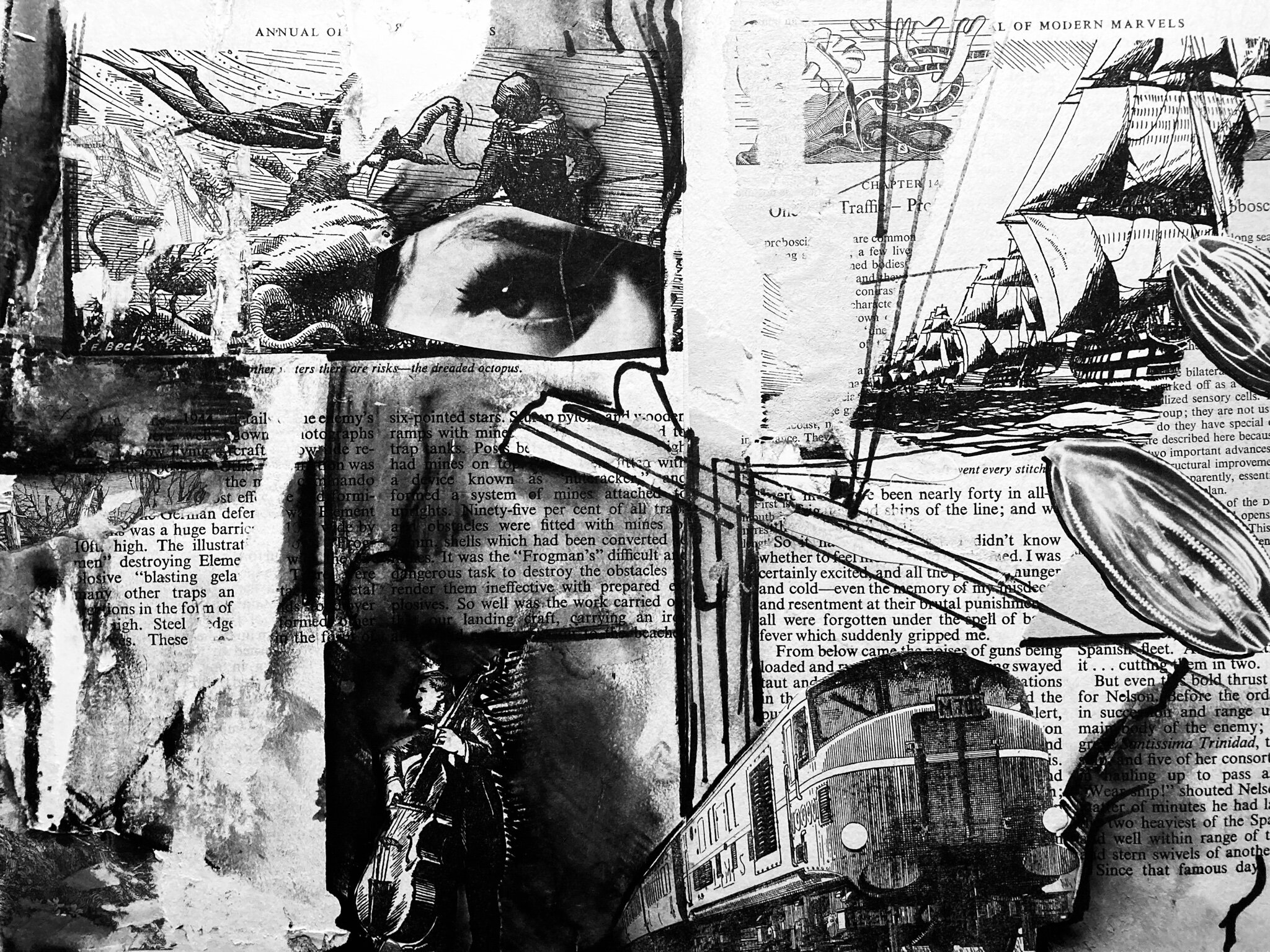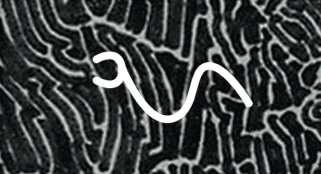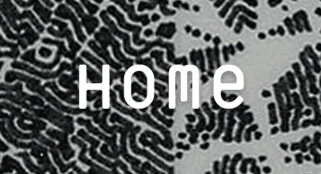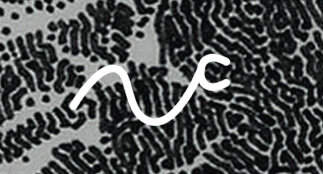Shifting the status of the mundane:
A review of All Particles and Waves by David Spittle
Images by David Spittle
Charles Simic, in his essay 'Stargazing in the Cinema: On Joseph Cornell', talks of Cornell's ‘cinematic imagination’ guiding his artistic production. The same might be said of David Spittle, whose first full-length collection was published last year by Black Herald Press. Spittle is also a filmmaker whose short film, Light Noise, was screened on the BBC in 2019, and if you flip over All Particles and Waves, the blurb on the back is not from a poet, but from the Canadian filmmaker, Guy Maddin. Spittle writes about Maddin's influence on his work in this book's postface essay, ‘In Part of All to Part in Waves’. He also interviewed Maddin, and discussed his work with John Ashbery, in his Light Glyphs, filmmakers on poetry and poets on film, series (recently published by Broken Sleep Books). To further illustrate that we are dealing with an artist working in, and inspired by, different mediums, the cover of All Particles and Waves is a striking surrealist collage created by Spittle.
'Anti-Samsara' is a key poem in this book and, three poems in, where the collection really takes off. According to Spittle's essay, it was written out of a feeling of 'revulsion' at a film that felt to him like 'an over-funded, National Geographic screensaver'. In its description, Samsara claims to explore the 'unfathomable reaches of humanity's spirituality and the human experience', seeing itself as something like a 'guided meditation'. Spittle found it had more in common with 'mainstream advertising' and that it missed the real essence of life, for instance, people 'failing in unremarkable ways', 'stubbing toes', forgetting what they went into a room for, and so forth.
A substantial poem covering three pages, 'Anti-Samsara' is about raising the status of the mundane, bringing the bland to the forefront, awarding it more significance and importance. Here we are presented with layer-upon-layer of images, scenarios and statements. The way it moves from one line to the next feels akin to the rhythm of a train, much like the one the somnolent narrator in Maddin's My Winnipeg is stuck on, which represents the hometown he is unable to leave. It's here, in the rolling and cutting, that this impression of life builds and we start to get a sense of Spittle's film influence, as we cut from scene to scene, from line to line.
The reader is presented with everything, from the banal 'bare cylinder of cardboard' found, reaching for the toilet paper, and the 'frying pan ... shedding unidentified burnt detritus' into food, to the melancholy: 'She would say "It's funny how things turn out" / with a note of sadness'; and the bitter: 'He hadn't always begrudged the happiness of others'. Hard-hitting facts and figures: '40,0000 men were sent out on German U-Boats... / 30,000 never returned'. The humorous, somewhat sarcastic: 'my brother is a real and functioning member of society, / he carries it off well' or the horrific: 'Mother ate her children / and then, cradling father's head, tried to recall their names'. The spectacular line: 'The table had been eaten on, fucked on, drawn on, cried on, danced on, and died on', does a great job of capturing life in its entirety, all by itself.
The title sequence is made up of ten poems that run through the book in pairs, and is where Spittle's surrealism is at its absolute best. A collage of sorts, there is something quite Steinian in the language, word play and rhythm here. The sequence starts with a Woolf quote/epigraph, which is an important reference for this collection on the whole, because of Woolf's treatment of the commonplace, her status shifts of 'background' objects in her writing, which is also quite central to Spittle's work, as demonstrated in 'Anti-Samsara':
to whom the pitch of absurdity is sublime,
and a shoestring adorable
Virginia Woolf
The opening lines of the poems are repeated on the third and eighth line, and the second lines repeated on the sixth. Here is one of the most arresting in the sequence:
Where an old man pushes a pram
Under strip-lighting
Where an old man pushes a pram
Back and forth
In a go-to-sleep motion
Under strip lighting.
Preparing a menu
Where an old man pushes a pram
A meal for two
Will dine on one
This juxtaposition of the stark strip lighting and the man pushing a pram feels sinister, turning absurd once 'Preparing a menu' comes in.
In the eighth poem of the sequence, the combination of the 'mournful picnics', and the compelling image of beekeepers conversing in underwater archives is both dreamy and amusing:
The beekeepers spoke to one another
Underwater in the archives
The beekeepers talked to one another
And held mournful picnics
In the aquarium
Underwater in the archives
A cube of water sinking
The beekeepers spoke to one another
Swapping unheard elegies
For absent bees
This sequence perhaps feels the most bizarre and, along with 'Anti-Samsara', the most powerful in the book. There is something in the specificity of the images set against each other, in these definite lines and pattern, that hits a real sweet spot. Somehow, Spittle is more confident and unquestioning as he goes deeper into surrealism, applying this process. Perhaps it is the emotional distancing or oddness created by the strict lines and order, whatever the case, there is some kind of jackpot effect.
In amongst the non-sequiturs of 'The Rosetta Limerick' is an incredible scope of images:
'we are peanuts in the lobby and some of us have been trodden in and impressed upon the patterned convolutions of infinite carpet which is to say the best analogy would be a small child lifted into the air by a swarm of bees after poking the hive with a stick conversely'
The line feels reminiscent of the Oscar Wilde quote, 'We are all in the gutter, but some of us are looking at the stars'. The peanuts also seem to tie in with Bruno Schulz's 'astral dough' in relation to Spittle's 'stepped-on chewing gum' and 'the curled up litter on the pavement' in his postface essay, when talking of his childhood in America, he and his friend playing detective games, following trash as coordinates.
Another great line in this poem is: 'sex is best as a hypothetical proposition more fulfilling in the fantasies of its anticipation than in its happening'.
Much of this book, Spittle says on his website, is him simply aiming to 'transfer [the] visual enchantment' of the films and other visual stimulus he loves 'into ... language.' But, amongst the often abstract, as the above demonstrates, there are some moments when glorious on-the-nose truths burst out.
I realise that I have selfishly talked about one sequence and the two poems that I'm most taken with. To give some idea of what else is going on in this book, there are prose poems, poems written after Andrew Cotting, Joseph Cornell, Bruno Schulz, Lautréamont and Dorothea Tanning. With such a range of form, the poems could be compared to the shadow boxes of Joseph Cornell, with the words and intricate arrangements serving as the contents of the boxes. It should come as no surprise that Spittle's previous publication, a pamphlet with HVTN Press, was titled B O X and although less announced here, the boxes do continue and even make a physical appearance in the poem 'Screening'.
One of the things the essay at the back does beautifully is illustrate how art leads us to other art. For instance, how Spittle found Schultz through Maddin (and quite possibly how he discovered Maddin through Ashbery). In any case, his book is a celebration of art and the connections we make through a love of and fascination with it. Here, like with Cornell's boxes, there is nostalgia and sentimentality, in amongst the experimentalism and abstract, but also Simic's idea that 'the ideal box is like an unsolvable chess problem' seems to ring true.

